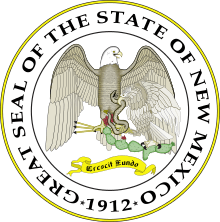George Curry (politician)
| George Curry | |
|---|---|
 | |
| Member of the U.S. House of Representatives from New Mexico's at-large district | |
|
In office January 8, 1912 – March 3, 1913 | |
| Preceded by | 2nd seat established |
| Succeeded by | 2nd seat abolished |
| 17th Governor of New Mexico Territory | |
|
In office 1907 – March 1, 1910 | |
| Preceded by | Herbert James Hagerman |
| Succeeded by | William J. Mills |
| Governor of Samar | |
|
In office 1905–1907 | |
| Preceded by | Segundo Singzon |
| Succeeded by | Maximo Cinco |
| Governor of Isabela | |
|
In office 1903–1905 | |
| Preceded by | Modern position created, last held by a Spanish Governor |
| Governor of Camarines Sur | |
|
In office 1901–1902 | |
| Preceded by | Modern position created, last held by a Spanish Governor |
| Succeeded by | Juan Pimentel |
| Personal details | |
| Born |
April 3, 1861 West Feliciana Parish, Louisiana |
| Died |
November 24, 1947 (aged 86) Albuquerque, New Mexico |
| Nationality | American |
| Occupation | politician |
George Curry (April 3, 1861 – November 24, 1947) was a U.S. military officer and politician.
Biography
He was born in West Feliciana Parish, Louisiana April 3, 1861. He attended the public schools. moved to New Mexico Territory in 1879 and worked on a cattle ranch until 1881. He acted as post trader at Fort Stanton, and engaged in the mercantile and stock business until 1886.
He was deputy treasurer of Lincoln County, New Mexico in 1886 and 1887, elected county clerk in 1888, county assessor in 1890, and sheriff in 1892. He served as a member of the Territorial senate in 1894 and 1896, serving as president in his final year in the body.
During the Spanish American War he served in Theodore Roosevelt's Rough Riders. He did not see action in Cuba, but did participate in the fighting in the Philippines.
After returning from the war, he became sheriff of Otero County, New Mexico in 1899, when he resigned to join the Eleventh Volunteer Cavalry. He then served from December 16, 1899 to March 20, 1901 as the Governor of the Province of Camarines in 1901, the chief of police of the city of Manila for the remainder of 1901, the Governor of the Province of Isabela from 1903 to 1905, and the Governor of the Province of Samar from 1905 to 1907.
He served as the 18th Governor of New Mexico Territory from 1907 to 1910,[1] and upon the admission of New Mexico as a State into the Union was elected as a Republican to the Sixty-second Congress and served from January 8, 1912, to March 3, 1913.
Curry declined to be a candidate for renomination in 1912. He then engaged in the hotel business in Socorro, New Mexico, was private secretary to US Senator Holm O. Bursum in 1921 and 1922,and was a member of the International Boundary Commission from 1922 to 1927. After retiring, he moved to a ranch near Cutter, and served as State Historian from 1945 until his death in Albuquerque on November 27, 1947, with interment in the Santa Fe National Cemetery. Curry County, New Mexico was named in his honor.
References
- ↑ State of New Mexico (July 2012). Kathryn A. Flynn, ed. 2012 Centennial Blue Book (PDF). Diana J. Duran. Office of the New Mexico Secretary of State. p. 210.
External links
- United States Congress. "George Curry (id: C001002)". Biographical Directory of the United States Congress.
| Political offices | ||
|---|---|---|
| Preceded by Herbert James Hagerman |
Governor of New Mexico Territory 1907–1910 |
Succeeded by William J. Mills |
| United States House of Representatives | ||
| Preceded by none |
Representative from New Mexico 1912–1913 |
Succeeded by Representatives cut to one |


